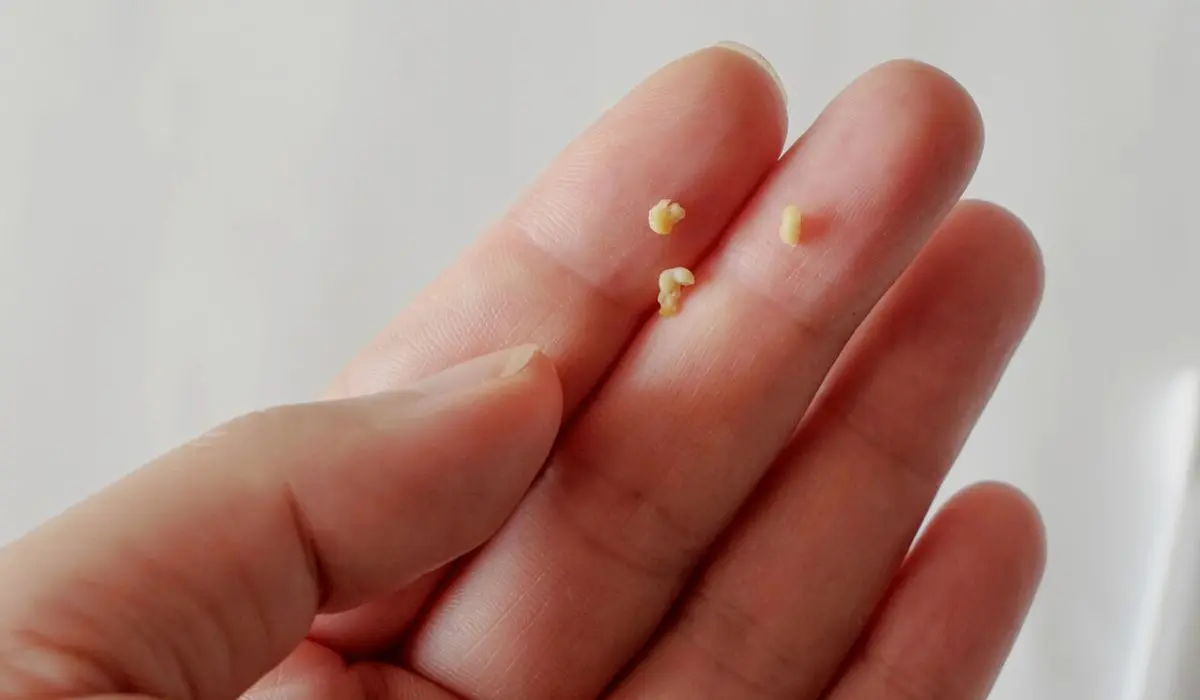Tonsil stones, also known as tonsilloliths, are calcified accumulations of debris and bacteria that form in the crypts and crevices of the tonsils. They are a common problem that can cause bad breath, irritation, and other uncomfortable symptoms.
While not inherently dangerous, tonsil stones can greatly affect the quality of life. Understanding what causes them and how to prevent their recurrence can help manage and treat them effectively.
What Are Tonsil Stones? How Are They Caused?
Tonsil stones form when food particles, dead cells, mucus, and bacteria collect in the tonsil crypts and crevices. These materials harden over time due to a gradual accumulation of calcium salts, creating a calcified mass lodged in the tonsils.
This typically occurs in people with scarred, irritated, or chronically inflamed tonsils that have excessive debris accumulation in their slots and openings. Those prone to recurrent tonsillitis are at higher risk. Tonsil stones may also develop in persons with large tonsils obstructing salivary ducts, allowing saliva to pool.
The calcified masses are typically composed of various minerals like ammonia, magnesium, and carbonate as well as dead white blood cells and oral bacteria. Poor oral hygiene contributes to bacterial growth and stone formation.
Acidity in saliva encourages minerals to solidify while stale saliva promotes bacterial proliferation. Stones can range from microscopic to several millimeters or centimeters in size.
Symptoms Of Tonsil Stones
In many cases, small tonsil stones do not cause noticeable symptoms initially.

Larger stones that accumulate over time may begin producing symptoms like:
🔹 Bad breath – One of the most common complaints, as sulfur compounds produced by bacteria create foul odors.
🔹 Difficulty or pain while swallowing – Large stones may obstruct swallowing or irritate throat tissues.
🔹 Ear pain – Stones may press on nerves leading to the ear, causing referred pain.
🔹 Tonsil swelling and inflammation – Bacteria and debris accumulation may inflame tonsil tissue.
🔹 Sore throat – Larger stones can physically irritate the throat.
🔹 White debris in the throat – Stone fragments may dislodge and be seen in the back of the mouth.
🔹 Coughing or choking – Dislodged fragments may stimulate coughing or choking.
🔹 Metallic taste – Mineral composition alters taste perception.
🔹 Halitosis – Foul breath odor may be noticeable to others.
🔹 Irritation or itching – Inflamed tonsils with debris cause physical irritation.
If you experience any persistent, unexplained symptoms involving the throat, tonsils or ears, seek medical evaluation. Proper diagnosis and treatment can provide relief.
How Can You Prevent The Coming Of Tonsil Stones?
While some people may be prone to tonsil stones due to anatomical factors, you can take steps to prevent recurrence and minimize risks:
🔹 Maintain excellent oral hygiene through twice daily brushing, daily flossing, and using antiseptic mouthwash. This reduces bacterial growth.
🔹 Get treatment for sinus issues or post-nasal drip, as excess mucus triggers stone formation.
🔹 Avoid dairy products if you tend to produce more mucus or saliva.
🔹 Gargle salt water to clear debris from tonsil crypts.
🔹 Stop smoking and tobacco usage, as it irritates tonsil tissue.
🔹 Avoid eating just before bedtime, as food debris can collect overnight.
🔹 Drink plenty of water to help flush away bacteria. Stay hydrated.
🔹 Consider taking probiotic supplements to introduce good bacteria that out-compete bad bacteria.
🔹 Use a humidifier, as chronic dry mouth promotes stone growth.
🔹 Get routine dental cleanings to remove accumulated deposits.
🔹 Consider tonsillectomy if stones are large or keep recurring frequently.
Removal Techniques For Tonsil Stones
🔹 Gargling salt water – The salt helps dislodge debris while the motion can remove stones from tonsil crypts. Also try gargling mouthwash, olive oil, or lemon juice.
🔹 Water irrigation – Using a device like a Waterpik, aim a gentle pulsating stream at the stone to flush it out gradually.
🔹 Manual pressing – Carefully press out stones using a clean cotton swab or toothbrush handle. Never use sharp objects.
🔹 Medications – Over-the-counter guaifenesin thins mucus so stones can wash out. Stay hydrated.
🔹 Coughing/gagging – Natural motions may expel some smaller stones.
🔹 Suctioning – Doctors can use specialized suction tools to vacuum out stones precisely under visualization.
🔹 Ultrasonic devices – These break down stones for easier removal by vibrating their surface.
🔹 Laser treatment – Focused laser pulses fragment stones for elimination.
🔹 Tonsillectomy – Removing the tonsils surgically may be required if stones are very large or keep recurring frequently.
Seek medical help promptly if:
🔹 Stones are extremely large or worsen.
🔹 Bleeding occurs.
🔹 Pain or swelling is significant.
🔹 Stones increase in frequency.
🔹 Home removal efforts fail.
🔹 Use caution when trying manual removal to avoid injury or choking on fragments.
🔹Thorough oral hygiene helps prevent recurrence after stone removal.
🔹 Removing stones does not cure the underlying cause, so continued prevention is key.
With the right technique for the situation, tonsil stones can be removed effectively. See an ENT specialist if home efforts are unsuccessful.
Related:- What Causes Epilepsy? How To Treat Them Effectively?
Precautions While Having Tonsil Stones
If you have developed tonsil stones, take care to prevent complications:
🔹 Avoid poking at stones forcefully, as this can damage the tonsils and worsen debris buildup.
🔹 Never attempt to dislodge a very firmly lodged stone on your own with sharp objects. Seek a doctor.
🔹 Rinse gently after eating to clear food particles rather than scrubbing vigorously at the tonsils.
🔹 Refrain from eating crunchy, seedy foods that can get stuck in tonsil openings.
🔹 Take any antibiotics prescribed fully to treat the underlying infection completely.
🔹 Monitor the size and shape of stones; immediately consult an ENT if stones are unusually large, asymmetrical, or only on one tonsil.
🔹 Keep up with your oral hygiene routine consistently, even when stones are not active.
🔹 Stay adequately hydrated to prevent saliva and mucus from drying out.
Conclusion
Tonsil stones are a common annoyance but not usually a medical emergency on their own. With a combination of preventive self-care steps and proper medical treatment, if stones are large or problematic, they can be managed effectively.
Practicing good oral hygiene, hydrating adequately, rinsing your tonsils gently after eating, quitting smoking, and avoiding irritants can help reduce recurrence. But do see an ENT promptly if symptoms are severe or persist despite home care. A tonsillectomy is also an option for recalcitrant cases.
Read More:- How To Fix Your Inner Ear Infection? Relief Measures!
FAQs
1. Are tonsil stones a sign of cancer?
No, tonsil stones themselves are not indicative of cancer. But if they occur frequently or only on one side, it is wise to get examined by an ENT specialist.
2. How do you remove stuck tonsil stones?
Do not pick at firmly stuck stones aggressively. Use a gentle water irrigation technique or try gargling crushed ice to encourage them to dislodge. Visit an ENT doctor if needed.
3. Do tonsil stones fall out on their own?
Smaller tonsil stones may get coughed out or fall out on their own eventually. Larger ones generally require removal by irrigation, suction, or other methods by a doctor.
4. Can you prevent tonsil stones after a tonsillectomy?
Yes, tonsil removal surgery prevents the recurrence of tonsil stones by eliminating the tonsil tissue where stones form. However, the risks and recovery period of a tonsillectomy must be carefully considered.
5. Are tonsil stones common in adults?
Yes, tonsil stones can occur in both children and adults. However, they tend to be more prevalent in adults as tonsil anatomy tends to provide more crevices for debris to collect.

